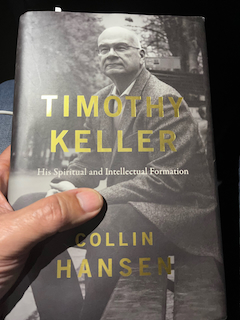 Timothy Keller: His Spiritual and Intellectual Formation by Collin Hansen
Timothy Keller: His Spiritual and Intellectual Formation by Collin Hansen
My rating: 5 of 5 stars
Who would have known that the year this book was published would be Keller’s last on this Earth and make his passage into the land of the Emmanuel our King. Just finished the last two chapters today, just a couple days after we read this news.
This book is not a biography proper, a full chronology of his life but it does offer a sequence of four periods of time in the life of Tim Keller and the different people that influenced his thinking, his theology and his ministry. Keller was a man with a keen intellect and a capacity to synthesize what he read to inform his personal life and ministry. This led him to plant a church in New York City that not only would impact the city but would be become the hub for a global church planting movement. Since the very first book that I read by Keller, The Reason for God, I was impressed by his intellectual capacity and his spiritual life. I find his writing intellectually engaging and in particular, impressed by the way he is able to pull from diverse sources to support his ideas. As a reader, this was fascinating and led me to others sources to learn more of the topics he wrote about. Keller became one of my favorite writers (only once did I see part of a video teaching which I did not find as engaging as his writings). Hence, I was interested in reading this book about what formed and shaped Keller intellectually and spiritually. Hansen has done a good job in what he sought to do. I have learned much more about Keller that I did not know that influenced him, some that I am was already familiar.
Keller’s influence through his writings will continue to be helpful for those interested in engaging the culture with the Gospel. But more importantly, the people he led to Christ will continue to be a testament of his love for Him which will certainly be rewarded by our King.
“Only if our highest love is God himself can we love and serve all people, families, classes, races, and only God’s saving grace can bring us to the place where we are loving and serving God for himself alone and so for what he can give us,” Keller explained.” pp. 98-99
“For Keller, this meant training leaders not to see church as an escape from the hated city but a place to learn how to meet the city’s needs, both spiritual and physical. It meant forsaking “church growth” mod els that use the city and instead deploying the church in a “city growth” model that helps everyone flourish.” p. 156
“Churches that live for themselves die by themselves…. If our evangelism is to be effective, the church must be concerned to meet the surrounding need.” p. 158
“Just as the single most formative experience in our lives is our membership in a nuclear family, so the main way we grow in grace and holiness is through deep involvement in the family of God. Christian community is more than just a supportive fellowship; it is an alternate society. And it is through this alternate human society that God shapes us into who and what we are…. The real secret of fruitful and effective mission in the world is the quality of our community.” p. 215
